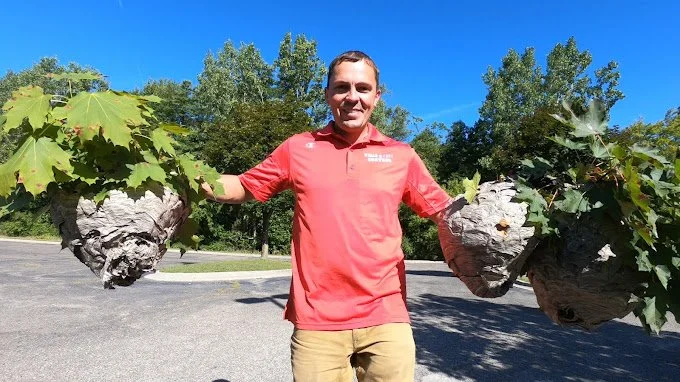Stinging insects in Michigan have essential jobs within our ecosystem. Predatory species help control populations of nuisance insects, and stinging insects are responsible for pollinating the crops, trees, and plants that we need to survive.
The problem with stinging insects is the stinger they have extending from the end of their abdomen. The stinger is what makes these pests unwelcome on our properties. Having a stinging insect nest in your yard or home dramatically increases the chances of you, your kids, or your pets being stung as stinging insects try to protect themselves or the nesting site.
Stinging insects that live in our area and regularly find their way onto our properties include:
Yellowjackets
Paper wasps
Bald-faced hornets
Mud daubers
Cicada killers
Carpenter bees
Stinging Insect Control
-
Are stinging insects dangerous?
Stinging insects that are social and live together in large groups (yellowjackets, paper wasps, and bald-faced hornets) are typically quite aggressive. Solitary wasps like mud daubers, cicada killers, and carpenter bees tend to be much more docile and only sting when they feel they are being put in harm’s way.
It is important to understand that any species of stinging insect can deliver painful stings and have venom strong enough to trigger a serious reaction in those who are allergic. Care should always be taken around any species of stinging insect!
Carpenter bees pose their own unique dangers when they are on our properties. Their females create individual nests in pieces of wood, usually choosing older or untreated pieces of wood. Their presence and nesting habits can cause structural damage to things like fences, decks, shingles, wooden trim, and wooden furniture.
Why do I have a stinging insect problem?
Stinging insects are outdoor pests and live in the same places we do. Stinging insects can become a problem on any property but tend to be most problematic on properties near wooded areas, bodies of water, fields, meadows, and parks.
Most of our yards provide stinging insects with a place to feed or nest or both. Gardens, flower beds, trees, trashcans, and outdoor eating areas offer these pests both food and shelter.
Where will I find stinging insects?
Stinging insects in Lake Orion, MI build their nests in various places, with the primary requirement usually being a place that offers them protection from the elements and predators.
Some of their most popular nesting spots include the following:
Ground holes that naturally occur in yards
The abandoned nests of small animals
The soil next to sidewalks and walkways
Tree cavities and tree branches
Shrubs and bushes
Roof eaves, deck rails, doorways
Attics and wall voids
How do I get rid of stinging insects?
At Wells Pest Control, we understand that home and business owners don’t want their indoor and outdoor spaces overrun by dangerous stinging insects. To get rid of stinging insects from your property, trust our professionals and our more than 18 years of pest control experience. We take pride in building close relationships with our customers and working together to ensure that your property’s unique pest control needs are met.
To learn more about protecting your property from stinging insects, reach out to Wells Pest Control today!
How can I prevent stinging insects in the future?
The following prevention tips can help keep stinging insects out of your yard and away from your home:
Keep tree branches cut back from your home.
Prune shrubs and bushes to prevent them from overgrowing and concealing a stinging insect nest.
Fill in ground holes you discover in your lawn.
Make sure open windows and doors have intact screens.
Place caps on chimneys and repair holes along the roofline.
Use caulk to seal spaces in exterior walls and the foundation of your home.
Leave a barrier between flower beds and your home’s exterior.
Remove areas of standing water from your property.
Spider Control
Spiders are predatory arachnids that live and hunt for their insect prey in both indoor and outdoor spaces. Spiders are naturally reclusive and have learned to live near people, staying mostly out of our sight. The one spider you see in your garden is just the tip of the iceberg; there are many more lurking around that you aren’t seeing. Luckily our pest control services in Michigan have you covered.
Spiders are easy to identify; their two body segments, eight legs, wingless bodies, and lack of antennae give their presence away. Spiders have hollow fangs that they use to inject the venom they possess into their prey to paralyze them. They also have a special gland to produce the silk they use to wrap their prey with, line burrows, or create webs.
-
Are spiders dangerous?
Spiders are difficult to control, create unsightly spider webs, and their quick movements are unsettling. However, only spiders that have venom strong enough to cause a physical reaction in people are considered dangerous. Luckily for all of us, only a couple of dangerous spiders live in the United States.
Most of the spiders that take up residence in our yards and homes are harmless; while all spiders have venom, nuisance spiders only have venom strong enough to affect their insect prey.
Why do I have a spider problem?
Spiders are a problem on properties that offer them plenty of spots to build their webs or burrows and plenty of insects to hunt. Our lawns, gardens, and flower beds offer spiders plenty of food and shelter. When you find spiders in your home, it is because the spiders have followed their insect prey indoors. They may also move inside to find a dark, quiet area to lay their eggs. Once indoors, if there is food available, they generally stay until the food runs out or they are forced to exit.
Where will I find spiders?
The most common places to find spiders in your yard are the same places you will find large populations of insects. Some of the spider's most common gathering spots include:
Gardens and areas of dense landscaping
Grass
Outdoor eating areas
Trash cans and recycling bins
Outdoor light fixtures
If spiders have moved inside your home, they will gather in quiet areas where there is likely to be some insect activity. The corners of rooms, windows, spaces under furniture, basements, and sink areas are where homeowners often spot spiders.
How do I get rid of spiders?
At Wells Pest Control, we understand that Lake Orion area home and business owners don’t want their indoor and outdoor spaces overrun by spiders. To get rid of spiders from your property, trust our professionals and our more than 18 years of pest control experience. We take pride in building close relationships with our customers and working together to ensure that your property’s unique pest control needs are met.
To learn more about the home pest control services in Michigan we offer to eliminate spiders from residential and commercial properties, reach out to Wells Pest Control today!
How can I prevent spiders in the future?
The following prevention tips can help stop spiders from taking over your home and yard:
Place gardens away from the exterior of your home.
Leave a barrier between any flowerbeds and your home’s exterior walls.
Inspect things like firewood, potted plants, and containers that have been outside before bringing them inside.
Remove leaf piles, excess wood piles, and other lawn debris from your yard.
Walk around the perimeter of your home, looking for cracks or other spaces that could allow spiders inside. Use silicone caulk or other material to seal those spaces.
Make sure there aren’t any openings around wires and utilities entering into your home. If any are discovered, use steel wool or another material to seal them.
Make sure weather stripping is placed around windows and doors and that screens are intact.
Knock down spider webs when you find them; if their webs are continuously disturbed, they will want to move elsewhere.
Contact us
Interested in working together? Fill out some info and we will be in touch shortly. We can’t wait to hear from you!

